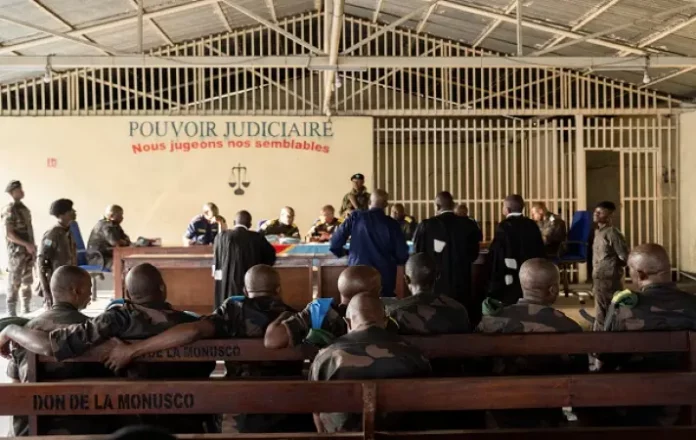A military tribunal in the Democratic Republic of Congo (DRC) has sentenced 13 soldiers to death, charging them with murder, looting, and cowardice amid escalating violence in the eastern region of the country. The landmark ruling comes as authorities attempt to tighten discipline within an army struggling to contain a rebel insurgency.
The verdict, delivered Tuesday in the town of Lubero, North Kivu province, followed a trial of 24 soldiers, signaling a stringent approach to tackling indiscipline in the military. Among the remaining accused, four received prison sentences ranging from two to ten years, six were acquitted, and one case is still under review.
Discipline and Despair on the Frontlines
The trial, described as “educational” by military sources, was an effort to address soldiers’ desertion from combat zones, which officials say has emboldened enemy forces, particularly the M23 rebel group. The insurgency, which is believed to have ties to neighboring Rwanda, has destabilized the region for nearly three years.
Mak Hazukay, an army spokesperson in North Kivu, underscored the urgency of restoring order in the ranks. “Some of the soldiers who are supposed to be fighting the enemy at the front have shown a kind of indiscipline,” Hazukay stated. “We had to organize this trial to set things right and send a message about the consequences of abandoning duty.”
Recent skirmishes in Lubero territory have highlighted the challenge posed by fleeing soldiers, often leaving strategic positions vulnerable to militant advances. The tribunal aimed to reaffirm the army’s commitment to protecting civilians, many of whom live in constant fear due to the ongoing conflict.
A Region Under Siege
North Kivu has long been a hotbed of violence. The resurgence of the M23 group has amplified the humanitarian crisis, displacing thousands and disrupting access to vital resources. Reports of looting and armed confrontations further destabilize the region, with civilians frequently caught in the crossfire.
International watchdogs have accused both the army and rebel groups of human rights abuses, including unlawful killings and extortion. For the military, maintaining a semblance of discipline is critical to reversing the narrative of incompetence and corruption that has eroded public trust.
Military prosecutor Kabala Kabundi reiterated the importance of rebuilding confidence between soldiers and civilians. “The hearings were intended to help restore trust between the military and the population,” Kabundi explained. He confirmed that all 13 convicted soldiers have five days to appeal their sentences.
Controversy Surrounds Death Penalty Sentences
The decision to impose death sentences has sparked debates about fairness and effectiveness. Human rights organizations have often criticized Congo’s judicial system for being harsh and opaque, especially in military courts.
Critics argue that public trials such as this may have more to do with setting an example than ensuring justice. “Military tribunals in the DRC have historically been used to make statements, but they fail to address systemic issues like poor training, low morale, and lack of resources,” said a Kinshasa-based political analyst.
One defense lawyer, representing a convicted soldier, labeled the proceedings as “flawed” and vowed to file an appeal. “These verdicts do not reflect due process, and we will challenge them,” he said in a brief interview.
The military justice system in Congo has come under increased scrutiny, with questions about impartiality and the swift nature of trials. Nevertheless, authorities remain steadfast, describing the convictions as a necessary measure to uphold discipline in a war-torn region.
Broader Implications
The tribunal’s decision highlights the broader challenges faced by the Congolese armed forces. Years of conflict, exacerbated by regional tensions and lack of external support, have left the military overstretched and under-resourced. Many soldiers are poorly equipped and receive irregular pay, creating conditions ripe for desertion and mutiny.
In a symbolic show of resolve, Lubero’s courtroom became a stage for the army to project strength and accountability. Yet, the verdict also underscores the complexities of governing through justice in a country wrestling with an enduring legacy of conflict and political instability.
A Fragile Future
As the DRC grapples with its multifaceted crisis, the sentencing of these soldiers might be remembered as a turning point—or a cautionary tale. Whether this approach restores order or sows further dissent remains to be seen.
For civilians in North Kivu, the immediate concern remains survival amidst continued uncertainty. The verdict serves as a grim reminder of the stakes involved, both for those serving on the frontlines and those caught in the region’s crosshairs.
Authorities now face the daunting task of addressing the root causes of disarray within the military, from inadequate support for soldiers to addressing allegations of corruption within the ranks.

